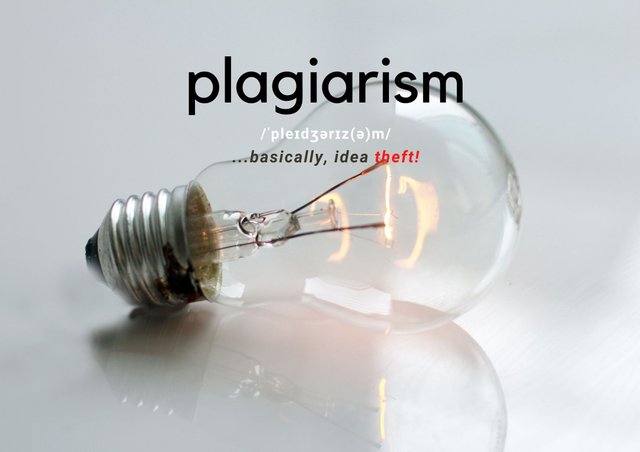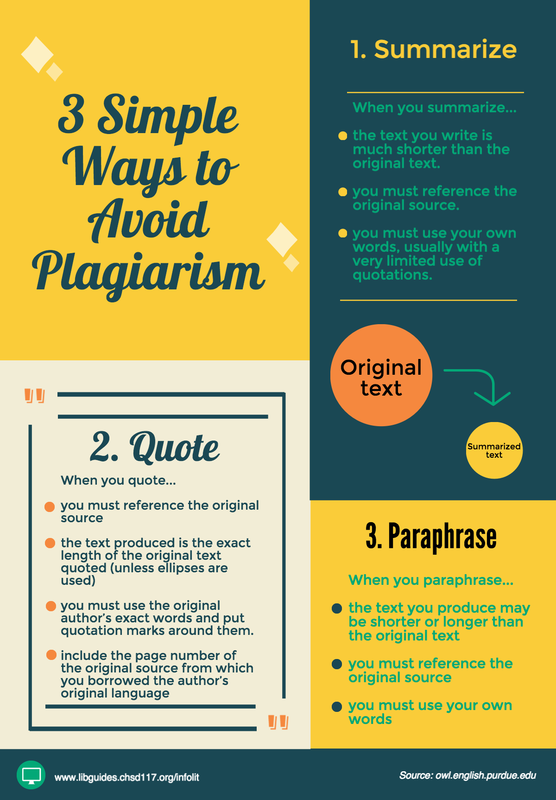Achievement 3 by @est.ticc Task: Content Etiquette
This is my achievement 3 post after going through the necessary.

According to Oxford's English Dictionary, "Plagiarism is presenting someone else's work or ideas as your own, with or without their consent, by incorporating it into your work without full acknowledgment. " Source
Therefore, it is okay to use others' words and ideas but you have to cite them, giving them credit for their work.
Committing plagiarism might save one's time for a short while, but it also comes at a high price.
Types of Plagiarism
There are various types of plagiarism and are all violations of content etiquette. The most common types are listed below:
Global or direct plagiarism: This involves copying an entire text or article (or a section of) someone else's work without attribution. This may include purchasing an essay.
Patchwork or mosaic plagiarism: This kind of plagiarism involves copying sections, phrases, passages from different sources (without citing any of them) to form an article or work of his/her own.
Self-plagiarism: According to Bowdoin University, "Self-plagiarism occurs when a student submits his or her own previous work, or mixes parts of previous works, without permission from all professors involved." Source
- Accidental plagiarism: Plagiarism is said to be accidental when a writer picks up information from sources and forgets to cite the references. It could be the unintentional use of sentences or phrases from a source or sources without referencing. It is therefore important to structurally distinguish your own sentences from those gotten from other sources. This would ensure proper attribution to the sources from which the information is gotten.
Plagiarism can also be deliberate which arises from laziness or the urge to take the praise for someone else's work. Some common examples include:
- Paraphrasing too closely to the original text.
- Forgetting to use quotation marks for a quote.
- Stating an idea you heard or saw somewhere without citing it.
- Giving the wrong information on a citation.
The most common form of plagiarism is text plagiarism. Others include art plagiarism, music plagiarism, image plagiarism, etc.
Is Plagiarism Worth It?
Plagiarism has been generally termed 'a form of academic dishonesty'. "Plagiarism is essentially theft and fraud committed simultaneously. It is considered theft because the writer takes ideas from a source without giving proper credit to the author. " Source
According to CollegeRaptor, Plagiarizing not only destroys the student reputation while in high school and college. Depending on the size of the offense, plagiarism can lead to legal repercussions. " SourceThe Copyright was therefore created as a means of curbing plagiarism.
Copyright laws protect written works from copying, and if you get caught, consequences will occur. At least, you may have a failing grade on a paper and at worse, you could face a lawsuit for copyright infringement if accused of plagiarism. " Source

In order to write an article or a paper, online or offline sources (actual books) are provided for one to get well informed about the topic in question before writing on it. Only exclusive sentences are most preferably advised to be quoted not every single sentence. Performing a global or direct type of plagiarism, even after citing references is not advisable, because a research involves viewing articles and posts from various sources and may sometimes be considered plagiarism.
Consequences of Plagiarism
This ranges from failing a classroom assignment to legal punishments, this depending on context. If one is accused of plagiarism, the original author of the piece has the right to pursue legal action against you. The consequences likely to be faced depends on where the piece was published. In a list;
- Lowered grade on paper
- Destroyed student and professional reputation
- Legal consequences: Copyright laws clearly state that writers cannot use someone else's material without citing the source and referencing it, even if they just paraphrase the work. If the original author catches your error, a lawsuit may occur.
- Monetary costs: If you have a lawsuit, you may be asked to pay monetary restitution. " Source
Avoiding Plagiarism
When you want to express an idea, paraphrase or summarize it.

Image Source
- Read the text
- Break the text down into sections
- Identify the key points in every section
- Write the summary.
Source
- Read the passage several times to fully understand the meaning
- Note down key concepts
- Write your version of the text without looking at the original
- Compare your paraphrased text with the original passage and make minor adjustments to phrases that remain too similar
- Cite the source where you found the idea.
Source
- In American English, use double quotation marks for quotations and single quotation marks for quotations within quotations.
- In British English, use single quotation marks for quotations and double quotation marks for quotations within quotations. Source
Real-life Examples of Plagiarism
In academia: From CNN
Plagiarism in academic settings is not just limited to words. Using the datasets or research findings of others is also considered plagiarism. In 2006, the Brookings Institute accused Russian President Vladimir Putin of having plagiarized 80% of his economics dissertation from a paper published by the University of Pittsburgh a few decades earlier. Dissertation plagiarism committed by other famous politicians, such as former Senator John Walsh, former German Defense Secretary Karl Theodor zu Guttenberg, and former Hungarian President Pal Schmitt, led to their resignations and their degrees being revoked. Source
In politics: From CNN
Many political speeches revolve around similar themes, but while it is natural to draw inspiration from previous speeches, paraphrasing too closely is considered plagiarism. In 2016, a speech Melania Trump gave at the Republican National Convention was found to have copied several paragraphs almost-verbatim from a speech Michelle Obama gave at the 2008 Democratic National Convention. While her staff claimed that she had incorporated “fragments of others’ speeches that reflected her own thinking,” she was widely considered to have plagiarized. Joe Biden was found to have committed similar plagiarism in a speech he gave during the 1988 presidential campaign, paraphrasing a speech by Welsh politician Neil Kinnock too closely. Source
How is Plagiarism Detected?
Plagiarism checkers
Online plagiarism checkers work in a similar way to the ones that universities use. You upload your document and the checker scans it, checking for any similarities to websites, journals, or other published sources within their database.
After the scan is complete, the checker shows you similarities it found between your text and the content in its database, often in the form of a percentage. You can then scroll through, adding quotations or citations if needed.
The accuracy of the results depend on the size of the database and the technology’s capabilities. Source
- Grammarly
- Duplichecker
- PaperRater
Special Thanks to @awesononso, @cryptokannon.